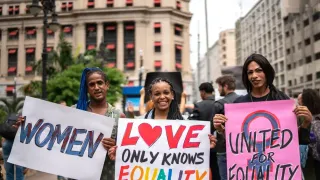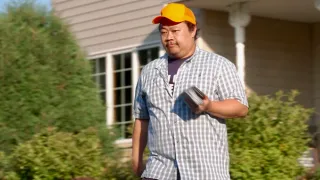
5 hours ago
Arthur Sze Is Appointed US Poet Laureate As the Library of Congress Faces Challenges
Hillel Italie READ TIME: 4 MIN.
At a time when its leadership is in question and its mission challenged, the Library of Congress has named a new U.S. poet laureate, the much-honored author and translator Arthur Sze.
The library announced Monday that the 74-year-old Sze had been appointed to a one-year term, starting this fall. The author of 12 poetry collections and recipient last year of a lifetime achievement award from the library, he succeeds Ada Limón, who had served for three years. Previous laureates also include Joy Harjo, Louise Glück and Billy Collins.
Speaking during a recent Zoom interview with The Associated Press, Sze acknowledged some misgivings when Rob Casper, who heads the library’s poetry and literature center, called him in June about becoming the next laureate. He wondered about the level of responsibilities and worried about the upheaval since President Donald Trump fired Librarian of Congress Carla Hayden in May. After thinking about it overnight, he called Casper back and happily accepted.
“I think it was the opportunity to give something back to poetry, to something that I’ve spent my life doing,” he explained, speaking from his home in Santa Fe, New Mexico. “So many people have helped me along the way. Poetry has just helped me grow so much, in every way.”
Sze’s new job begins during a tumultuous year for the library, a 200-year-old, nonpartisan institution that holds a massive archive of books published in the United States. Trump abruptly fired Hayden after conservative activists accused her of imposing a “woke” agenda, criticism that Trump has expressed often as he seeks sweeping changes at the Kennedy Center, the Smithsonian museums and other cultural institutions.
Hayden’s ouster was sharply criticized by congressional Democrats, leaders in the library and scholarly community and such former laureates as Limón and Harjo. It also led to a debate over who has the authority to decide on an interim replacement.
Although the White House announced that it had named Deputy Attorney General Todd Blanche as the acting librarian, daily operations are being run by a longtime official at the library, Robert Randolph Newlen. Events such as the annual National Book Festival have continued without interruption or revision.
Laureates are forbidden to take political positions, although the tradition was breached in 2003 when Collins publicly stated his objections to President George W. Bush’s push for war against Iraq.
Newlen is identified in Monday’s announcement as acting librarian, a position he was in line for according to the institution's guidelines. He praised Sze, whose influences range from ancient Chinese poets to Wallace Stevens, for his “distinctly American” portraits of the Southwest landscapes and for his “great formal innovation.”
“Like Emily Dickinson and Walt Whitman, Sze forges something new from a range of traditions and influences — and the result is a poetry that moves freely throughout time and space,” his statement reads in part.
Sze’s official title is poet laureate consultant in poetry, a 1985 renaming of a position established in 1937 as consultant in poetry to the Library of Congress. The mission is loosely defined as a kind of literary ambassador, to “raise the national consciousness to a greater appreciation of the reading and writing of poetry.” Initiatives have included Robert Pinsky’s “Favorite Poem Project,” for which the public would share thoughts on works of their choosing, and Limón’s “You Are Here,” which included poetry installations at national parks.
Sze wants to focus on a passion going back more than a half-century to his undergraduate years at the University of California, Berkeley — translation. He remembers reading some English-language editions of Chinese poetry, finding the work “antiquated and dated” and deciding to translate some of it himself, writing out the Chinese characters and engaging with them “on a much deeper level” than he had expected. Besides his own poetry, he has published “The Silk Dragon: Translations from the Chinese.”
“I personally learned my own craft of writing poetry through translating poetry,” he says. “I often think that people think of poetry as intimidating, or difficult, which isn’t necessarily true. And I think one way to deepen the appreciation of poetry is to approach it through translation.”
Sze is a New York City native and son of Chinese immigrants who in such collections as “Sight Lines” and “Compass Rose” explores themes of cultural and environmental diversity and what he calls “coexisting.” In a given poem, he might shift from rocks above a pond to people begging in a subway, from a firing squad in China to Thomas Jefferson’s plantation in Virginia. His many prizes include the National Book Award for “Sight Lines” and such lifetime achievement honors as the Jackson Poetry Prize and the Ruth Lilly Poetry Prize.
He loves poetry from around the world but feels at home writing in English, if only for the “richness of the vocabulary” and the wonders of its origins.
“I was just looking at the word ‘ketchup,’ which started from southern China, went to Malaysia, was taken to England, where it became a tomato-based sauce, and then, of course, to America,” he says. “And I was just thinking days ago, that’s a word we use every day without recognizing its ancestry, how it’s crossed borders, how it’s entered into the English language and enriched it.”






